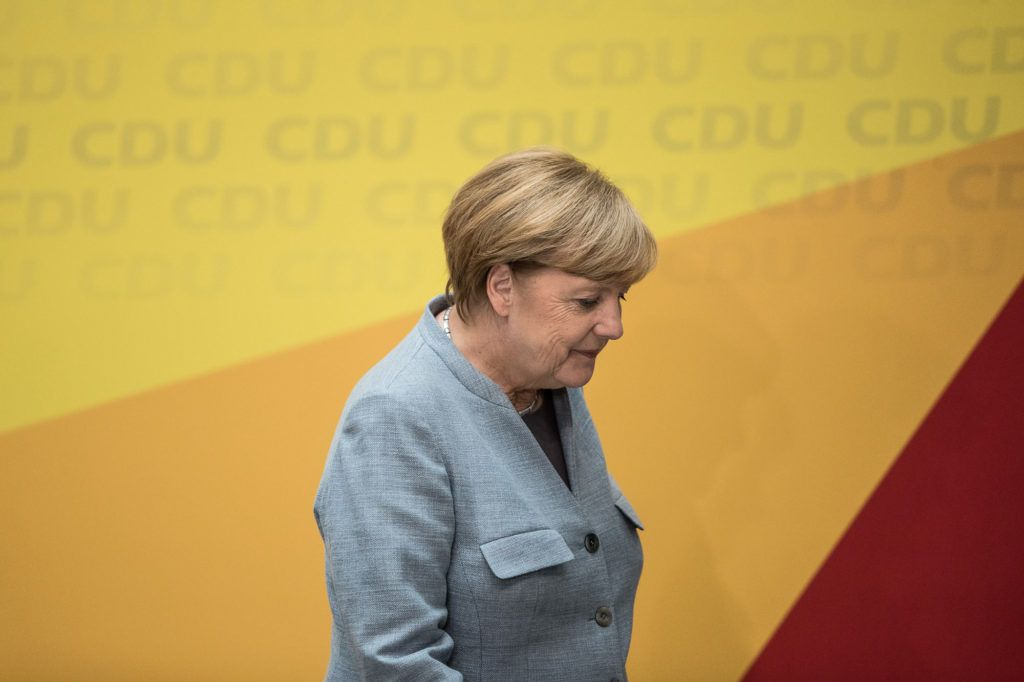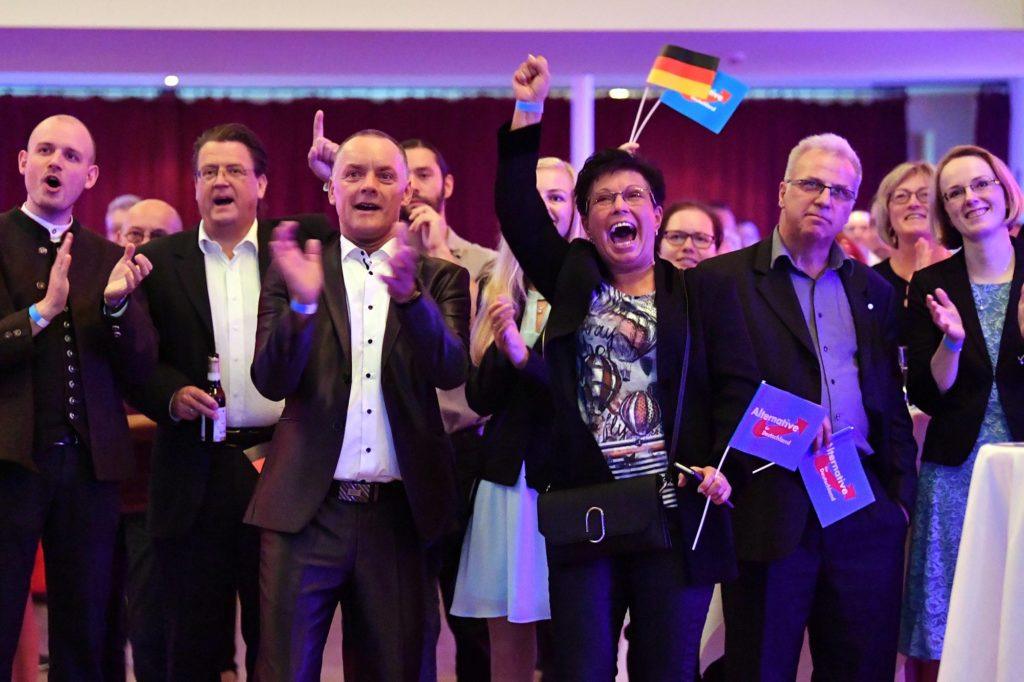Jan Woitas/DPA/PA Images
Liam Halligan reflects on the rise of Germany’s AfD. For more UnHerd reaction to last night’s German election results see our blog, and Graeme Archer’s piece on how cultural elites provoke populist backlash.
There can now be no doubt. Angela Merkel is a political giant. German Chancellor since 2005, Merkel’s victory in Sunday’s Federal elections, entitling her to serve a fourth term, means she is on course to run Europe’s biggest economy for at least sixteen years in total – matching her mentor Helmut Kohl.
The fact that a female physicist from former East Germany became leader of the Christian Democrats in 2000, little more than a decade after the fall of the Berlin wall, speaks well of modern Germany. The fact that ‘Mutti’ has remained in office for 12 years, and is now set to do four more, speaks well of the woman her people call ‘mummy’.
Yet Merkel is being forced to share the headlines, of course, with Alternative für Deutschland. Founded only in 2013, the anti-EU AfD party already sits in thirteen of sixteen German regional parliaments. Now, it will take its place in the Bundestag – the lower house of the national Parliament. The hard right has returned to the German political mainstream for the first time since the Second World War.
That, in itself, is shocking but not surprising. Having shown strongly in opinion polls, AfD was widely expected to win more than 5% of the national vote, enough to cross the threshold designed, ironically, to keep extreme parties out of Parliament.
Few predicted, though, that AfD would attract a vote share of more than 13%, leading them to control almost 90 of the 630 Bundestag seats. AfD – openly Islamophobic and determined to impose border controls – is now firmly ensconced as Germany’s third party. Its election performance, despite being riven with splits and months of pummeling by most German news outlets, is nothing short of a political earthquake.

Be in no doubt, then, that millions of voters just deserted the two parties that have dominated post-War German politics, opting instead to back the hard right. This is an astonishing outcome – the implications of which will be felt across Germany, and the broader EU, for years to come.
AfD’s surge can be explained to some extent, of course, by Merkel’s lenient stance on immigration. Over the last two years, continental Europe has seen the biggest influx of immigration in peacetime history – as streams of people have left a turbulent middle East, and crossed the Mediterranean from North Africa, in search of a better life. Germany last year registered 722,000 asylum seekers, 60% of the EU total, compared to 10% in Italy and 6% in France. In terms of registrations per head of domestic population, Germany outstripped Italy fourfold and France sevenfold. Some 45% of Germans now say ‘immigration’ is the most important issue facing their country, a larger share than any EU nation. As such, AfD’s vote share could have been even higher.
This upstart party’s rise, though, also reflects angst about Germany bank-rolling other EU members. Since 2010, when Eurozone bond markets went haywire, Berlin has bailed-out Greece, Portugal, Cyprus and other nations struggling to grow in the high-currency straitjacket that is monetary union. There is anger, too, about ‘under the counter’ financial transfers from Germany to other EU governments via the European Central Bank’s euphemistically named ‘Target2’ mechanism. As of mid-2017, the ECB-held liability owed to Germany by the rest of the Eurozone, particularly Italy, Spain and Greece, was €843 billion – close to 30% of German GDP.
Seemingly obscure, these massive Target2 transfers, buried in Germany’s national accounts, are referred to frequently across the country’s broadsheet and tabloid press. That’s because, if debtor countries crashed out of the Eurozone, they would default on these huge liabilities and Germany would seriously lose out. As such, AfD’s support is an amalgam of poor workers worried about immigration, not least in former East Germany, and wealthier eurosceptics concerned about Berlin spraying around their country’s cash – the latter often highly-educated, and often from West Germany.
The East is clearly AfD’s strong hold. State level polls in early August showed the party’s support running at 18% and 22% in Thuringia and Mecklenburg-Vorpommern – compared to just 9% nationally at the time. Eastern Germany accounts for just a fifth of German voters, but around a third of AfD’s support according to the German Institute for Economic Research (DIW). The other two-thirds comes from the West – reflecting AfD’s origins as ‘the professors’ party’ of Eurosceptic economists, concerned about the collapse of the single currency and the EU’s increasingly reliance on Germany to finance poorer member states.
AfD cannot, then, be dismissed as a party only of the economically precarious and uneducated. While the median income of AfD voters is lower than average, its supporters are spread across the broadest income distribution of any party, with a substantial minority of high earners. Nor is it the preserve only of the old and disgruntled. The average AfD supporter, says DIW, is younger than the average age of voters who backed the CDU, SPD and the free-market FDP. Only the Green party has voters that are more likely to fall in the key 30-54 age range than AfD.

The party, also, in earlier federal elections, has successfully mobilised those backing much smaller parties, or not voting at all. This support from ‘other voters’, no doubt, once the runes have been read, will be shown to have helped power AfD from obscurity to notoriety, securing a result which has eclipsed Merkel’s victory, securing Germany’s hard right front-page coverage across the world.
Merkel will now be forced, for the first time in German history, to secure a three-way coalition (not counting the CDU’s Bavarian sister party, the Christian Social Union). With the SPD in opposition, keeping AfD out of office, she will attempt to bring together the Greens and the FDP in a so-called Jamaica alliance (the three parties’ colours – black, green and yellow – matching Jamaica’s flag). This will not be quick or easy. Germany’s reputation for political stability, have just taken a knock, could yet sustain a lot more damage.
While Merkel hoped for ‘a better result’, she pledged to ‘listen to the concerns and anxieties’ of AfD voters. The EU’s cherished ‘Schengen agreement’, guaranteeing free movement of people, having been periodically suspended, is likely to come under serious scrutiny.
With AfD in Parliament, the CDU is more likely, also, to turn up the heat on the European Central Bank. For years, much of the German public has railed against the ECB’s now super-charged ‘quantitative easing’ programme. Money-printing plays on historic German fears of inflation and the nation’s army of savers don’t like the related negative real interest rates. Finance Minister, Wolfgang Schäuble, has bitterly criticized QE, repeatedly suggesting it has helped fuel AfD’s rise.
But what does this result mean to for ‘Europe’ – and, dare we mention it, Brexit? For one thing, the vision of Martin Schulz, the SPD leader and former European Parliament President, who pledged to put Germany at the heart of a ‘federal Europe’, has suffered a major setback. As such, French President Macron may find it even tougher to convince Berlin that the Eurozone needs a common fiscal policy, banking union and the other constructs required to make the single currency work in the long-term.
Britain, it is widely assumed, is more likely to secure a decent trade deal with the EU if Merkel is engaged. Germany’s huge £20 billion-plus UK trade surplus partly explains why the Chancellor’s basic approach to these Article 50 negotiations is that ‘there’s no need to be nasty’. With Merkel tied-up with coalition building in the coming months, and focused on domestic policy, progress in these Brexit talks is likely to remain slow.
Yet, this election result could work the other way. In coalition with the FDP, and with AfD resurgent, Merkel will emphasise ‘Europe’ less, stressing trade links, security and anti-terrorism instead. Addressing those themes means getting down to the business of Brexit and making sure cooperation with the UK remains as extensive as possible.







Join the discussion
Join like minded readers that support our journalism by becoming a paid subscriber
To join the discussion in the comments, become a paid subscriber.
Join like minded readers that support our journalism, read unlimited articles and enjoy other subscriber-only benefits.
Subscribe